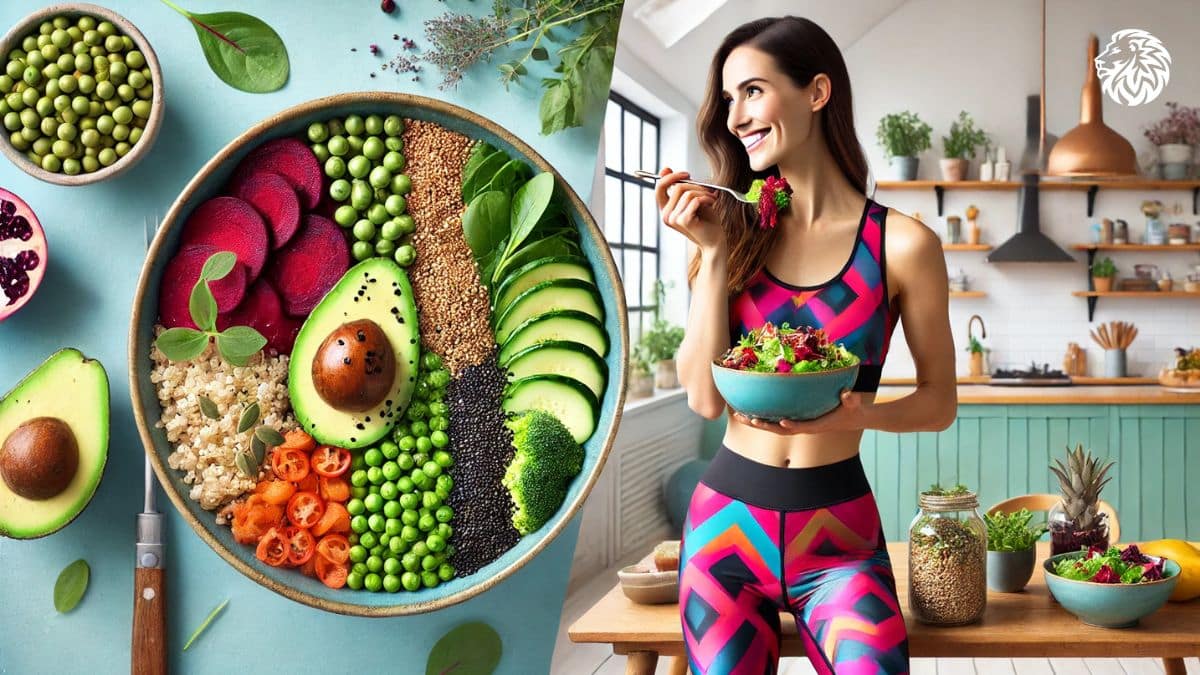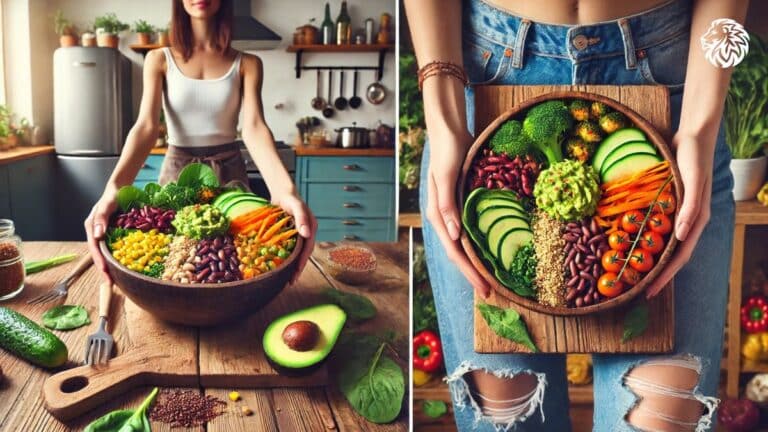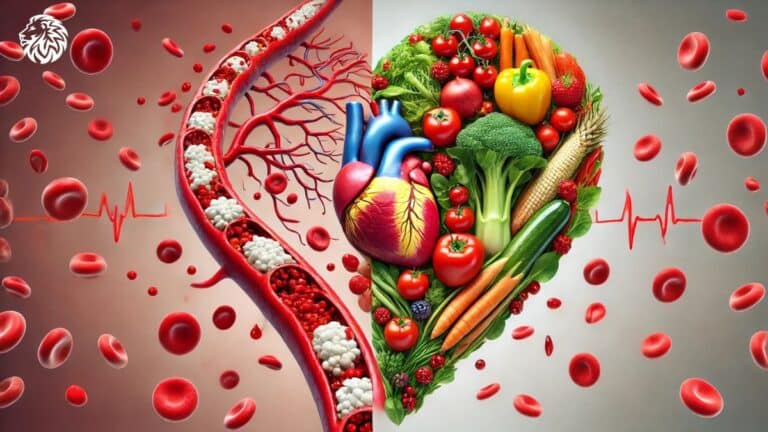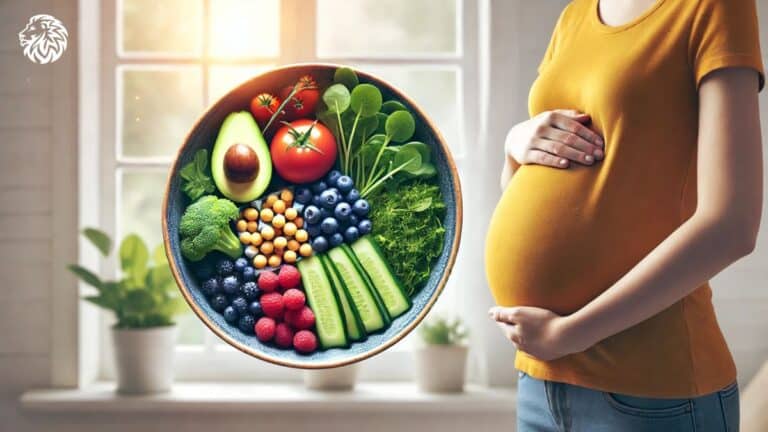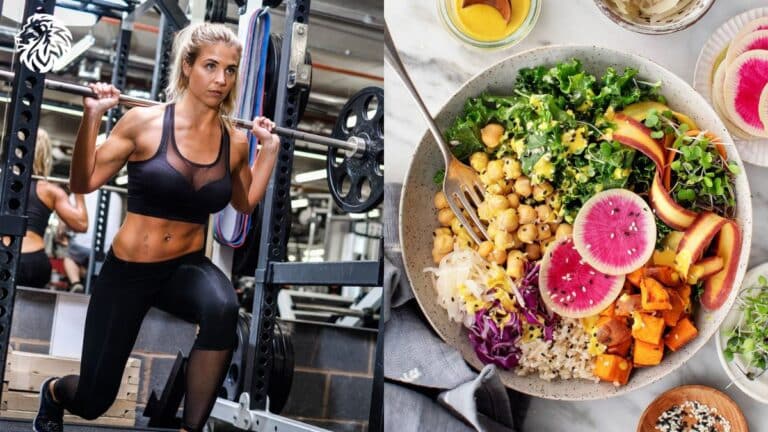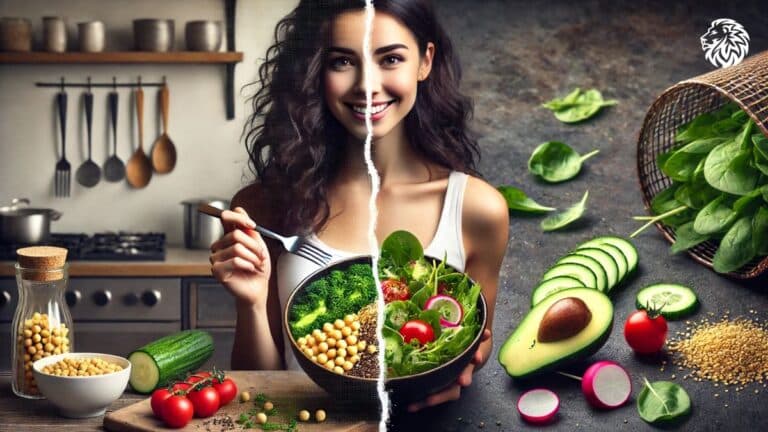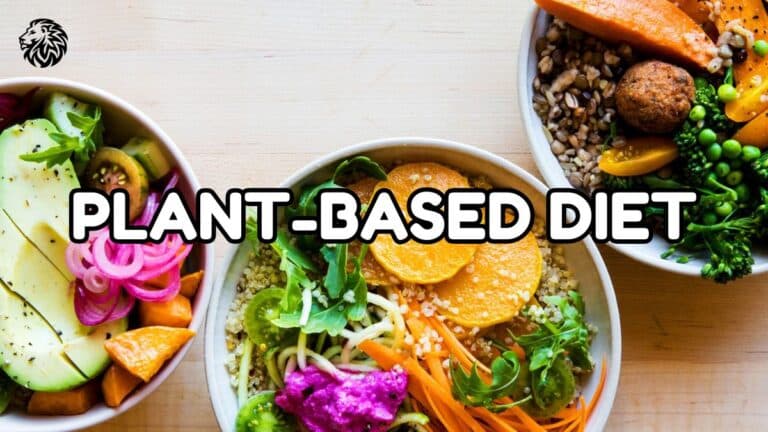Importance of High-Protein Plant-Powered Eating
Jumping into the tasty world of high-protein plant-based grub can totally level up your health game. Not only does it keep your heart happy, but it’s also great for those workout goals like shedding extra pounds or pumping up your strength.
Why Go For Plant Proteins?
Plant power is more than a trend—it’s a solid way to beef up (pun intended) your diet. More of the good stuff generally means more energy, making you feel fuller for longer, and kicking weight to the curb (Healthline). Imagine chomping on mouth-watering, plant-powered meals that feed both your hunger and your protein needs.
What’s in it for you?
- Strong Muscles: Munching on plants with high protein (~1.6g per kg, daily) can beef up muscles just as well as varied diets for folks not yet hitting the gym hard (PubMed).
- Full Tummy: Those plant proteins can make you feel stuffed, which helps in keeping food cravings in check.
- Slim Down or Stay Fit: Packing in those plant proteins might boost your weight loss by holding on to muscle and cranking up your metabolism.
Plants with a Protein Punch:
- Lentils: 18g per cooked cup.
- Beans: Around 15g per cooked cup.
- Seitan: 25g per 3.5 ounces (100g).
- Tofu, Tempeh, Edamame: 12-20g per 3.5 ounces (100g) (Healthline).
| Food | Protein (Serving) |
|---|---|
| Lentils | 18g per cooked cup |
| Beans | 15g per cooked cup |
| Seitan | 25g per 3.5 ounces (100g) |
| Tofu, Tempeh, Edamame | 12-20g per 3.5 ounces (100g) |
More Plant Hits:
- Nutritional Yeast: Protein-rich with a cheesy vibe.
- Spirulina: 8g of complete protein per 2 tablespoons, with a sprinkle of goodness (Healthline).
- Spelt and Teff: Great old grains packed with protein.
- Hemp and Chia Seeds: Filled with protein and healthy fats.
- Quinoa and Amaranth: Full of good proteins with all the amino extras.
- Ezekiel Bread: Uses sprouted grains and beans for a balanced protein kick.
Curious about plant-powered living? Swing by plant-based diet benefits to see all the protein party foods open to you.
Focusing on these protein-packed plants helps you enjoy a diet that’s both fun and healthy. Whether you’re building those biceps, looking to trim down, or just into living that plant life, toss these eats into your meals for a real difference. For tips on starting out, don’t miss plant-based diet for weight loss.
High-Protein Plant Foods
Switching up your meals with more high-protein plant-based delights? That’s gonna be tasty and good for you. Time to dive into some stellar plant foods that pack a protein punch, perfect for anyone on the lookout to up their game.
Lentils and Their Nutritional Profile
Lentils aren’t just for soups; they’re a nutritional rock star, hitting you with fiber, iron, folate, and manganese. Imagine this: a cup of cooked lentils gives you more than half of your fiber for the day and about 18 grams of protein. Neat, right?
| Nutrient | Amount per 1 cup (198g) of cooked lentils |
|---|---|
| Protein | 18g |
| Fiber | 15g |
| Iron | 6.6mg |
| Folate | 358μg |
| Manganese | 1mg |
Mix them up in everything from stews to salads or even some spicy curries. Lentils are your go-to for vegan meal prep.
Beans and Their Protein Content
Beans – these bad boys are a superstar in whole food eating! With about 15 grams of protein per cooked cup, they bring the goods. Plus, they’ve got iron, folate, and goodies that help battle cholesterol and manage sugar levels. Perfect for your belly, too.
Popular types of beans and their protein content per cooked cup:
| Bean Type | Protein (g) |
|---|---|
| Black Beans | 15g |
| Kidney Beans | 15g |
| Chickpeas | 14.5g |
| Pinto Beans | 15g |
Sort out your bean plan with our plant-based meal planning guide.
Seitan as a Rich Protein Source
Step aside, other proteins, seitan’s in town! It’s made from the gluten in wheat and offers a whopping 25 grams of protein per 3.5 ounces. Knocked it out of the park, didn’t it?
| Nutrient | Amount per 3.5 oz (100g) of Seitan |
|---|---|
| Protein | 25g |
| Carbohydrates | 14g |
| Fat | 2g |
Seitan’s got that fleshy feel, making it excellent for mimicking meat in lots of dishes. A must-try for those aiming for weight loss on a plant-based diet.
Tofu, Tempeh, and Edamame
If you’re rockin’ soy, tofu, tempeh, and edamame are your best buddies. These soy treats are a must for packing in protein, calcium, and iron into your day.
| Soy Product | Protein per 3.5 oz (100g) |
|---|---|
| Tofu | 8 – 15g |
| Tempeh | 15 – 20g |
| Edamame | 12g |
Make sure to check out easy plant-based recipes for inspiration using these soy stars.
Add these plant powerhouses to your meals, and you’ll be all set to hit your nutritional marks while enjoying awesome, varied meals.
Unique Plant Protein Sources
Switching to a high-protein plant-based diet doesn’t mean your meals have to be boring. Let’s chat about two nifty protein sources that you’ll want to keep handy: spirulina and mycoprotein.
Spirulina and Its Nutritional Value
Meet spirulina, the superhero of the algae family. Packing 8g of complete protein in just two tablespoons, this blue-green wonder is more than just a pretty color (Healthline). It’s loaded with goodies like iron, magnesium, riboflavin, and potassium, all the things your body craves.
| Nutrient | Amount per 2 Tbsp (14g) |
|---|---|
| Protein | 8g |
| Iron | 11% DV |
| Magnesium | 12% DV |
| Riboflavin | 15% DV |
| Potassium | 5% DV |
Beyond its nutritional punch, spirulina is packed with antioxidant, anti-inflammatory, and potentially anti-cancer powers. These little miracles might just give your immune system a boost, help keep your blood pressure in check, and do wonders for your blood sugar and cholesterol (Everyday Health).
How do you get this powerhouse into your meals? Easy-peasy. Stir it into smoothies, mix it in juices, or sprinkle it on your salads. Spirulina’s flexibility makes it a no-brainer addition to your meal prep, jazzing up your dishes with both flavor and nutrition.
Mycoprotein as a Meat Substitute
Say hello to mycoprotein, your new meaty friend from fungus land (Fusarium venenatum, to be precise). With 15-16g of protein per 3.5 ounces, it’s a strong contender for your new meat substitute (Medical News Today). Its meat-like texture is so convincing it can even fool your taste buds.
| Nutrient | Amount per 3.5 oz (100g) |
|---|---|
| Protein | 15-16g |
| Fat | 3g |
| Carbohydrates | 6g |
| Fiber | 2g |
While mycoprotein is mostly safe, some folks might have allergic reactions, but this is pretty rare. Be cautious with products that sneak in egg whites, especially if you’re staying vegan (Healthline).
You can toss mycoprotein into stir-fries, soups, and burgers to create dishes that feel familiar but with a unique twist. It’s an easy way to bump up your protein, while enjoying that satisfying meaty taste and texture.
By exploring fresh plant protein options like spirulina and mycoprotein, you’re not just fine-tuning your diet; you’re jazzing it up. With these choices, you get a nutritionally balanced meal plan that’s perfect for your plant-based diet for weight loss and overall health journey.
For more inspiration and delicious ideas, swing by our plant-based meal planning section.
Planning a Balanced Plant-Based Diet
Thinking about going plant-based for more protein while still getting everything your body needs? Let’s figure out how you can chow down in style and stay in top shape on your plant-based adventure.
Meeting Protein Needs
Getting protein from plants is a bit like trying to squeeze water from a stone because they come packed with fiber, making it trickier for your body to soak up all the good stuff. You’ll wanna mix up your protein sources, so you don’t leave your muscles hanging.
Check out these plant powerhouses you can toss into your meals:
| Food | Protein Content per 100g |
|---|---|
| Lentils | 9g |
| Chickpeas | 19g |
| Black Beans | 21g |
| Seitan | 25g |
| Tofu | 8g |
| Tempeh | 19g |
| Edamame | 11g |
For more on this, swing by our page on plant-based protein sources.
Ensuring Essential Nutrient Intake
It’s not just about the muscle fuel; there’s a whole list of other goodies you need from your plant-based lifestyle. Skimping on this could leave you running empty on vitamin B12, iodine, iron, calcium, zinc, and omega-3s. Here’s your game plan for staying stocked:
- Vitamin B12: Mostly found in animal goodies, so grab some fortified foods or supplements to catch up.
- Iron: Plants play hard-to-get with iron. Pair iron-rich bites like spinach and lentils with vitamin C friends like bell peppers to boost the intake.
- Calcium: Think fortified plant drinks, tofu, and those leafy greens your mom told you about.
- Omega-3s: Go nuts with chia seeds, flaxseeds, and walnuts to nab those omega-3s.
- Zinc: Beans, lentils, and seeds are your go-to crew for zinc.
Here’s your cheat sheet:
| Nutrient | Food Source |
|---|---|
| Vitamin B12 | Fortified plant milks, nutritional yeast |
| Iron | Spinach, lentils, chickpeas |
| Calcium | Fortified plant milks, tofu, kale |
| Omega-3s | Chia seeds, flaxseeds, walnuts |
| Zinc | Beans, lentils, pumpkin seeds |
Looking for meal ideas? Peep our top tips on plant-based meal planning.
By picking the right food crew and teaming them up smartly, you can rock a diet that hits all your health targets. Want to know why going plant-based is a good move? Check out plant-based diet benefits. If you’re thinking of jumping into the vegan pool, our no-stress guide on plant-based diet for beginners is here to help you kick things off.
Health Benefits of a Plant-Based Diet
Weight Loss and Plant-Based Diets
Thinking about switching up your meal plan and seeing if dropping the bacon can help shed some pounds? You’re definitely not riding solo. Grab this: Scientific brains with big glasses have figured that munching on plants and skipping the meat aisle can potentially help with weight loss. A study roped in 65 folks who wanted to lose some chunk and had them try this whole-food, plant-based thing for a year. Guess what? They ended up dropping an average of 9.25 pounds! That’s like shedding your winter coat.
Let’s break it down:
| Group | BMI Value |
|---|---|
| Vegans | 23.6 |
| Non-Vegetarians | 28.8 |
Looking at those numbers, you can’t ignore the fact that folks munching on spinach instead of steak generally sport healthier figures. Munch on lentils, beans, and tofu to help fit into those jeans you’ve been eyeing. Hit up our guide to grab bites and tips to stay on track.
Reduced Risk of Chronic Diseases
Eating more greens isn’t just about squeezing into a smaller size. It’s like unlocking those cheat codes for health—think less doctor visits. Here’s how saying no to burgers can keep you and your body chilling:
- Lower Risk of Type 2 Diabetes: Munch more plants and dodge that diabetes bullet. Plants can give a 34% lower chance of getting Type 2 diabetes. Showing off the numbers, 2.9% of vegans had diabetes against 7.6% in non-vegetarians.
- Reduce Stroke Risk: Stuffing yourself with fruits and veggies cuts your stroke risk by 21%. So maybe grab a banana instead of that vending machine snack when the 3 PM slump hits.
- Lower Mortality Rates: Stick to the green side, and you might lower your odds of all-cause bye-byes by 25%. Think of healthy plant picks as an extra life, slashing risk even more by another 5%.
- Prevention of Heart Disease and Certain Cancers: Numerous studies note lower heart disease and cancer rates on plant-based diets. Follow some Harvard wiz and pop broccoli on your plate instead of chicken wings.
Jumping into a plant-based path gets you riding the wave of these health perks while enjoying a rainbow of tasty, meat-free bites. For those who’ve decided to swap chicken for chickpeas, we’ve got you with resources on plant-based nutrition and plant-based recipes. Keep things fresh and funky with our best plant-based cookbooks.
Challenges of a Plant-Based Diet
Going all-out veggie can be quite the ride, especially if shedding a few pounds is on your mind. But let’s face it, it’s not all sunshine and rainbows. You’ve got to be clued-up about missing out on some key nutrients and making sure you’re not skimping on the protein.
Nutrient Deficiencies in Vegan Diets
Eating vegan isn’t just carrot sticks and good vibes. It might leave you short on some crucial stuff if you’re not keeping a keen eye.
- Vitamin B12: Think of Vitamin B12 as a club VIP, most often chilling in meats, eggs, and the like. Miss out on this and you might face some serious issues like nerve wrangling and blood whoopsies. To avoid such drama, popping a B12 supplement is a pretty smart move.
- Iron: The iron from plants? Well, it’s like trying to water a plant with a dropper compared to the heme iron in meat (that’s the good stuff). As a vegan, bump up your iron game with leafy greens and maybe a supplement or two.
- Zinc: Skipping out on zinc can make you feel low, give you the runs, or even make you lose hair. Chuck in some zinc-loaded food or grab a supplement to keep it at bay.
- Selenium: This one’s a bit elusive in plant foods. Without enough, your body might throw a fit. Brazil nuts are a quick fix, or you can pick up a selenium supplement at the pharmacy.
- Calcium and Vitamin D: Ditching dairy can turn your bones into biscuits risking breakages. Try fortified plant milks or grab some supplements to get your fill.
Risks of Inadequate Protein Intake
Staying on top of your protein game is key, especially when you’re banking on plants.
- Protein Sources: Plants can give you the protein you need, so long as you’re mixing it up. Go for lentils, beans, seitan, tofu, tempeh, and edamame. Here’s how they stack up:
| Food Item | Protein (g) per 100g |
|---|---|
| Lentils | 9.0 |
| Black Beans | 8.9 |
| Seitan | 25.0 |
| Tofu | 8.0 |
| Tempeh | 19.0 |
| Edamame | 11.2 |
- Protein Quality: Not all plant proteins hit the mark on essential amino acids. Mix and match – beans and rice are a classic combo – to cover all your bases.
- Muscle Maintenance: Low protein can mean losing muscle and upping your injury risk – not ideal. Keep fit by loading up on high-protein plant eats at every meal.
| Protein Needs by Activity Level | Protein (g) per kg of body weight |
|---|---|
| Sedentary | 0.8 |
| Active | 1.0–1.2 |
| Athletes | 1.2–2.0 |
Eating plants like a boss means thinking ahead to make sure you’re topped up on everything your body needs. If you’re just getting started, our guide on how to jumpstart your plant-based journey has all the cool tips you need.
